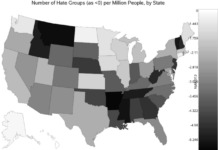For almost 20 years, claim after claim has been promoted with dubious accuracy when it comes to establishing blame for the death of hip-hop legend Tupac Shakur. According to a new documentary titled Murder Rap, each and every claim is unfounded, save for the finger that points to Sean “Diddy” Combs.
The documentary heavily focuses on evidence compiled by retired Los Angeles Police Department (LAPD) detective Greg Kading, who worked for three years on the Tupac Shakur and Christopher “Biggie Smalls” Wallace murder cases.

Kading’s claim is that as a product of growing hostilities between Combs and Marion “Suge” Knight, co-founder and then-CEO of West Coast-based Death Row Records, Combs hired a Crips gang member by the name of Keith “Keffe D” Davis to kill Shakur and Knight.
Kading alleges that on the night of Sept. 7, 1996, Keffe D’s nephew, Orlando “Baby Lane” Anderson, got into an altercation with Tupac in Las Vegas, Nev. at the Bruce Seldon-Mike Tyson WBA heavyweight championship fight. Just hours later, Anderson pulled up next to Knight and Shakur at a stoplight and fired into the vehicle, killing the 25-year-old rapper.
Kading further alleges that in retaliation for Shakur’s murder, Suge Knight hired Bloods gang member Wardell “Poochie” Fouse to kill Biggie Smalls. Biggie would be murdered in an incident that eerily mirrored Tupac’s murder on March 9, 1997.
So how did Kading come to his conclusions? According to the retired detective, he had put Keffe D in a precarious situation while investigating the murders. Keffe D confessed to being paid by Combs to kill Shakur and Knight in exchange for leniency with other charges against him. Kading wasn’t so much convinced by Keffe D agreeing to speak about his connection to Tupac’s murder, but was by how much information Keffe D volunteered to the detective. From The Huffington Post:
“‘If his intention was to just get away with it, so to speak,’ Kading told HuffPost, ‘it would have been very easy for him to not include all of the details that he did.’
These extra details, according to the documentary, include the allegation that Combs hired Keefe D for the crime.”
Greg Kading’s involvement in the murders of Tupac Shakur and Biggie Smalls began in 2006 when he was assigned to reinvestigate the murders following a civil lawsuit brought against the LAPD by Biggie’s mother, Voletta Wallace. Wallace’s lawsuit was hinged on a popular theory that the LAPD covered up an officer’s involvement in her son’s murder. Kading was tasked with disproving the theory posited in Voletta Wallace’s lawsuit, as well as many of the other theories surrounding the murders.
Kading compiled enough evidence to exonerate the LAPD from any claim of wrongdoing in Biggie Smalls’ death.
However, during his investigation, Kading allegedly found evidence supporting the notion that the LAPD had actually solved the murders, but instead opted not to pursue formal charges against Combs for Shakur’s murder because of Combs’ celebrity status and because the men who killed the two rappers had already been killed in separate incidents.
Orlando Anderson was killed in a shootout in Compton, Calif. on May 29, 1998 with rival gang members. Wardell Fouse was killed in an ambush in Compton on July 24, 2003.
Could Kading’s claim that Sean “Diddy” Combs paid a man to murder Tupac Shakur and Suge Knight have some weight? To find out, watch Murder Rap, which is currently available on iTunes and is scheduled to be released on Netflix in the spring.
Featured image by Richard Burdett, available under a Creative Commons Attribution 3.0 Unported license.




